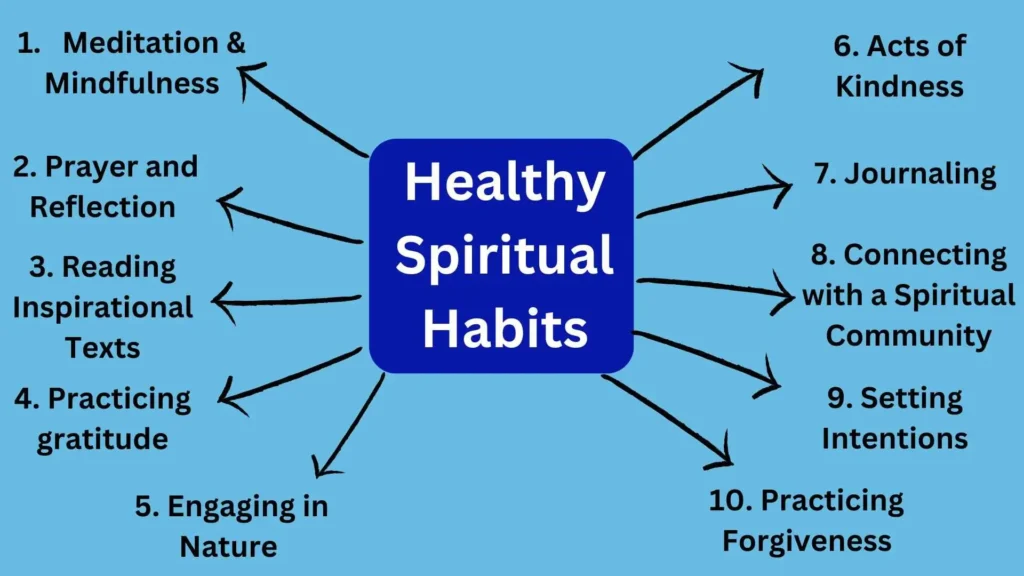In today’s fast-paced world, where stress and distractions abound, nurturing our spiritual well-being has become more crucial than ever. Healthy spiritual habits are important for a more fulfilling life.
“Physical training is good, but training for godliness is much better, promising benefits in this life and in the life to come.” (1 Timothy 4:8)
Leaving a healthy spiritual life is the wish of every person, but few take practical steps towards it.
How can you become a spiritual person? Here, you will find the essence of spirituality. Make a quick spiritual growth in your life by developing good spiritual habits.
Table of Contents
What is Spirituality?
The quality of being concerned with the human spirit or soul as opposed to material or physical things is called spirituality. It is the broad concept of a belief in something beyond the self. Spirituality can involve religious traditions, holistic practices, or personal journeys of meaning and purpose.
In simple terms, spirituality is an individual’s search for ultimate or sacred meaning in life.
10 Important Healthy Spiritual Habits
In today’s world, maintaining a healthy spiritual life can significantly enhance your overall well-being. By incorporating healthy spiritual habits into your daily routine, you can achieve a sense of purpose and fulfillment.
These habits not only nurture your spiritual wellness but also positively impact your mental and physical health.

1. Meditation and Mindfulness
Meditation and mindfulness are essential spiritual habits for leading a healthy spiritual life.
Meditation is an effective technique for improving your spiritual health and achieving personal equilibrium and habits of a healthy spiritual life.
According to a survey conducted in the US, 73 percent of adults reported that they meditate to reduce stress because meditation helps them achieve inner calm and clarity. It allows you to focus on the present moment, which reduces tension and anxiety.
Mindfulness, on the other hand, entails being completely present in your daily tasks. This spiritual practice can increase your awareness and appreciation for small things, resulting in a more spiritually fulfilled life.
2. Prayer and Reflection
Prayer and reflection are key habits for spiritual growth. Whether you’re religious or not, taking time to pray or reflect can provide a sense of connection and purpose in life. Prayer allows you to express gratitude, seek guidance, and find comfort during difficult times.
Reflection, which can be done through journaling or quiet contemplation, helps you evaluate your actions and thoughts, promoting personal growth. Engaging in regular prayer and reflection can deepen your spiritual life and enhance your overall well-being.
3. Reading Inspirational Texts
Reading inspirational texts is a wonderful habit to foster spiritual wellness. These texts can be religious scriptures, philosophical works, or books on personal development. They provide wisdom, encouragement, and a broader perspective on life.
By setting aside time each day to read and reflect on these writings, you can nourish your mind and spirit. This practice can inspire you to live a more purposeful and meaningful life.
4. Practicing gratitude
Gratitude is one of the most simple yet effective healthy spiritual habits. By concentrating on what you are grateful for, you can alter your mindset from one of scarcity to abundance.
Keeping a gratitude notebook, in which you write down what you are grateful for each day, can greatly improve your attitude and spiritual well-being. It is one of the self-love habits that boosts spirituality.
Gratitude promotes a positive attitude in life and enhances relationships with others. It encourages you to appreciate the current moment and its benefits, which boosts your overall sense of spiritual contentment.
5. Engaging in Nature
Spending time in nature is a very effective approach to connecting with your spiritual self. Nature has a relaxing and renewing influence on both the mind and body.
Being in nature allows you to contemplate and find serenity, whether you’re taking a walk in the park, hiking in the mountains, or simply resting by a lake.
This habit might help you feel more grounded and connected to your surroundings. It’s a reminder of the beauty and simplicity of life, which is important for spiritual wellness.
6. Acts of Kindness
Performing acts of kindness is a practical approach to improving your spiritual life. Kindness provides a sense of belonging and compassion, both of which are vital components of spirituality. Helping others not only improves their lives but also enriches yours.
Acts of kindness can be as easy as smiling, assisting a neighbor, or volunteering your time. These behaviors generate positive energy and a sense of accomplishment, which contributes to your spiritual development and overall pleasure.
7. Journaling
Journaling is an excellent habit for spiritual development. Writing down your thoughts, feelings, and experiences might help you understand your inner self. Journaling allows you to process your feelings, make objectives, and reflect on your spiritual path.
It’s a secure place to question your views and principles, which is critical for personal growth. Regular journaling can help you become more self-aware and comprehend your life’s purpose.
8. Connecting with a Spiritual Community
Connecting with a spiritual community can significantly improve your spiritual health. Being part of a community of like-minded people offers support, encouragement, and a sense of belonging.
These communities, whether they be churches, meditation groups, or spiritual study circles, provide chances for people to share their experiences and learn from one another.
Creating a good social circle is a prominent healthy habit of teenagers. You can also regularly participate in a spiritual community. It can help you develop your practice and lay a solid foundation for your spiritual life. Spiritual and social connections can help you live a happy life.
9. Setting Intentions
Setting intentions is a habit that can help you find clarity and focus on your spiritual journey. Intentions, as opposed to goals, are guiding principles for how you desire to spend your life. They represent your values and goals, allowing you to match your activities with your spiritual beliefs better.
Setting daily or weekly intentions allows you to stay aware of your spiritual path and make intentional decisions that promote your progress and well-being.
10. Practicing Forgiveness
Forgiveness is vital for maintaining the habits of a spiritual life. Holding grudges and resentments can weigh heavily on your spirit, causing negative emotions and tension. Letting go of grudges is one of the healthy relationship habits.
It enables you to remove these burdens and achieve tranquility. Forgiveness is not about tolerating harmful actions but about removing yourself from their consequences.
Forgiveness can help you heal emotionally while also cultivating a more compassionate and loving perspective. This habit can improve your relationships and spiritual well-being.
Benefits of Spirituality
Spirituality is often misunderstood, but it has significant benefits for people. We may nourish our minds, bodies, and relationships by developing healthy habits for spiritual growth.
Understanding how spirituality improves our lives and how to be spiritual might inspire us to cultivate spiritual growth habits and live a satisfying, balanced life.
1. Fostering Compassion and Empathy
Spirituality encourages compassion and empathy, which are necessary components of good relationships. By exercising empathy and understanding, we can improve our interactions with others, resulting in more meaningful and helpful relationships. This caring approach can have a good knock-on impact, benefiting our social circles and communities.
2. Setting Life Goals
Spirituality helps us find purpose and meaning in life. By exploring our values and beliefs, we can set meaningful life goals that align with our true selves. This sense of direction and purpose can lead to a more fulfilling and satisfying life.
3. Cultivating Inner Peace
In addition to goal setting, spirituality promotes inner tranquility. Regular spiritual activities, such as prayer and thought, enable us to connect with our inner knowledge and find consolation in life’s tumult. This internal tranquility is necessary for long-term enjoyment and well-being.
How to Become Spiritual?
Spirituality is something that can be achieved if you practice and adopt the following habits.
- Nature has a way of anchoring us and understanding us of the larger picture. Spend time outside, whether it is a stroll around the park, a hike in the mountains, or simply sitting beneath a tree. Take in the beauty around you and let it fill you with tranquility.
- The quest for healthy habits of spirituality is ongoing. Be open to new experiences and ideas. Continue asking questions and seeking answers. Remember, there are no right or wrong ways to be spiritual. It is all about what feels right to you.
- Setting intentions is about being mindful of how you want to live each day. It is different from setting goals; it is more about your overall attitude and approach to life. Start your day by setting an intention, such as being kind, staying present, or seeking joy.
- Gratitude is a simple but profound spiritual practice. Take time every day to reflect on what you are grateful for. This habit might change your viewpoint and make you appreciate the current time.
Conclusion
Incorporating these healthy spiritual habits into your daily routine can lead to a more balanced and fulfilling life. They help you connect with your inner self, find purpose, and improve your overall well-being. By making these practices a part of your everyday life, you can experience profound spiritual growth and a deeper sense of peace and happiness.
FAQs
Can I be spiritual without being religious?
Spirituality and religion can overlap, but they are not the same. You can be spiritual without adhering to a specific religion. It is all about finding what resonates with you.
What if I don’t feel anything spiritual?
It is normal to have periods where you don’t feel particularly spiritual. Keep exploring different practices and give yourself time. Spirituality is a journey, not a destination.




